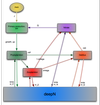NetLogo

NetLogo is a programmable modelling environment for simulating natural and social phenomena. It is particularly well suited for modelling complex systems developing over time. Modellers can give instructions to hundreds or thousands of agents, all operating independently. This makes is possible to explore the connections between the micro-level behaviour of individuals and the macro-level patterns that emerge from the interaction of many individuals.
Written in Java, NetLogo was developed by Uri Wilensky in 1999, and has been in continuous development ever since at the Center for Connected Learning and Computer-Based Modeling. http://ccl.northwestern.edu/netlogo/
For queries about this topic, contact Melissa Saeland.
Projects

Care Life Cycle
Seth Bullock, Sally Brailsford, Jason Noble, Jakub Bijak (Investigators), Elisabeth zu-Erbach-Schoenberg, Jason Hilton, Jonathan Gray
This research programme brings together teams of researchers from social sciences, management science and complexity science to develop a suite of models representing the socio-economic and demographic processes and organisations implicated in the UK’s health and social care provision. Integral to the project is working with our partners in the public sector and communicating the results of these models to policymakers allowing them to effectively plan for the future.

Excitable Boys: An Exploration of the Role of Social Groups in the Self-radicalisation Process Using Agent-based Modelling.
Jason Noble (Investigator), Lewys Brace
This work built upon the seminal work of Sageman (2008), and his hypothesis that the self-radicalisation phenomenon that we are currently witnessing across Europe and the United States stems from self-organising ‘bunches of guys’. More specifically, there was a focus on how individuals can influence one another through social links; and how this can lead to behaviour, similar to deindividuation, arising through their interactions. Complexity theory and agent-based modelling were used in order to explore the interactions that are believed to lie at the heart of this psycho-social phenomenon, and justification is given for this approach. The model presented demonstrated that social bonds can lead to a greater number of individuals ‘rebelling’ against the status quo.

Integrating least-cost models with agent-based simulations: example hedgehog responses to fragmented landscapes
Jason Noble, Patrick Doncaster (Investigators), Angela Watkins
This study presents a novel analysis of an agent-based model of hedgehog movements integrated with a least-cost model of hedgehog dispersal and validated in landscapes with a varying degree of habitat fragmentation. A comparison of the fitness of individual agents reveals that incorporating a simple rule into
individual agents, to better mimic movement choices by real hedgehogs, dramatically affects the relationship between individual fitness and fragmentation.

Lagrangian modelling of ecosystem dynamics at the Bermuda Atlantic Time-series Study station
Tom Anderson, Seth Bullock (Investigators), Melissa Saeland
Focus in the marine ecosystem modelling community is starting to shift towards the use of Lagrangian, agent-based models as these are believed to produce more realistic results. The basic assumptions behind these models have not been thoroughly tested, and this project aims to undertake a detailed study of Lagrangian marine ecosystem models, before creating one to investigate the dynamics at the Bermuda Atlantic Time-series Study station (BATS).

Simulating Household Decision Making in Rural Malawi
James Dyke, Kate Schreckenberg (Investigators), Samantha Dobbie
A scoping exercise to determine whether data collection tools of the social sciences can be used effectively in the construction of empirical ABM. Focus fell upon simulating drought coping strategies of Malawian smallholders. Model implementation enabled inferences to be made concerning the impact of drought and input subsidies upon smallholder food security.
People
 Jakub Bijak
Jakub BijakProfessor, Social Sciences (FSHS)
 Sally Brailsford
Sally BrailsfordProfessor, Management (FBL)
 Seth Bullock
Seth BullockProfessor, Electronics and Computer Science (FPAS)
 Patrick Doncaster
Patrick DoncasterReader, Biological Sciences (FNES)
 Mohamed Bakoush
Mohamed BakoushLecturer, Management (FBL)
 James Dyke
James DykeLecturer, Electronics and Computer Science (FPAS)
 Kate Schreckenberg
Kate SchreckenbergLecturer, Civil Engineering & the Environment (FEE)
 Tom Anderson
Tom AndersonPrincipal Research Fellow, National Oceanography Centre (FNES)
 Jason Noble
Jason NobleResearch Fellow, Electronics and Computer Science (FPAS)
 Lewys Brace
Lewys BracePostgraduate Research Student, Electronics and Computer Science (FPAS)
 Samantha Dobbie
Samantha DobbiePostgraduate Research Student, Electronics and Computer Science (FPAS)
 Graham Elliott
Graham ElliottPostgraduate Research Student, Electronics and Computer Science (FPAS)
 Jonathan Gray
Jonathan GrayPostgraduate Research Student, Social Sciences (FSHS)
 Jason Hilton
Jason HiltonPostgraduate Research Student, Social Sciences (FSHS)
 Leo Jofeh
Leo JofehPostgraduate Research Student, Electronics and Computer Science (FPAS)
 Iza Romanowska
Iza RomanowskaPostgraduate Research Student, Humanities (FH)
 Melissa Saeland
Melissa SaelandPostgraduate Research Student, National Oceanography Centre (FNES)
 Massimo Stella
Massimo StellaPostgraduate Research Student, Electronics and Computer Science (FPAS)
 Angela Watkins
Angela WatkinsPostgraduate Research Student, Biological Sciences (FNES)
 Elisabeth zu-Erbach-Schoenberg
Elisabeth zu-Erbach-SchoenbergPostgraduate Research Student, Management (FBL)
 Petrina Butler
Petrina ButlerAdministrative Staff, Research and Innovation Services